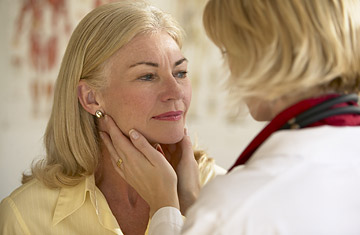
Any woman approaching her 40s knows that time is not on her side when it comes to fertility. A decade before menopause, her chances for having a child begin to dip. But what if women could pinpoint when they will hit menopause, and figure out exactly how many child-bearing years they have left?
That's what scientists in the Netherlands have done. Reporting in the Journal of Clinical Endocrinology and Metabolism, they report that a simple blood test, for a hormone called anti-Mullerian hormone (AMH), could help women predict when they will enter menopause, and therefore how to set their fertility timetable. "Predicting menopause itself might not be that interesting," admits Dr. Jeroen van Disseldorp, lead author of the study and a fertility specialist at University Medical Center Utrecht. "But menopause is associated with fertility. So, predicting menopause might become more and more important in the future as women continue to delay childbearing."
Researchers began with a discovery made five years ago: that the small, immature follicles in the ovary release AMH. The number of these follicles is a good indicator of a woman's fertility, since they house maturing eggs. The more follicles a woman has, the better her chances of conceiving — and the higher her levels of AMH. Currently, IVF clinics rely on an ultrasound to count follicles, but these images can be clouded by intestinal tissue, or, in some cases, they may not be powerful enough to detect every remaining follicle.
Measuring AMH, says van Disseldorp, is potentially much more accurate. In his study, he included 144 women aged 25 to 46 in order set baseline levels of AMH, and then compared these levels to those of over 3,000 women aged 58 to 70 who had undergone menopause. By creating a regression curve, he determined a cutoff level of AMH that triggered menopause, and by placing the young women along this curve based on their AMH levels, could predict when they would hit the Change — and how many more years of fertility they could expect.
Van Disseldorp acknowledges that the precise AMH level for menopause may differ among populations, and thus anticipates that additional studies like his will need to both verify his finding and perhaps establish other cutoff levels for women of different racial and ethnic backgrounds.
Some IVF clinics are already using AMH as an indicator of a woman's child-bearing potential, and cancer doctors look to AMH levels in ovarian cancer patients to determine whether chemotherapy has affected their fertility. So far, van Disseldorp thinks the test will be especially effective in women over 30, when AMH levels begin to decline naturally. After all, when it comes to a clock, even a biological one, wouldn't you want it to be as accurate as possible?
